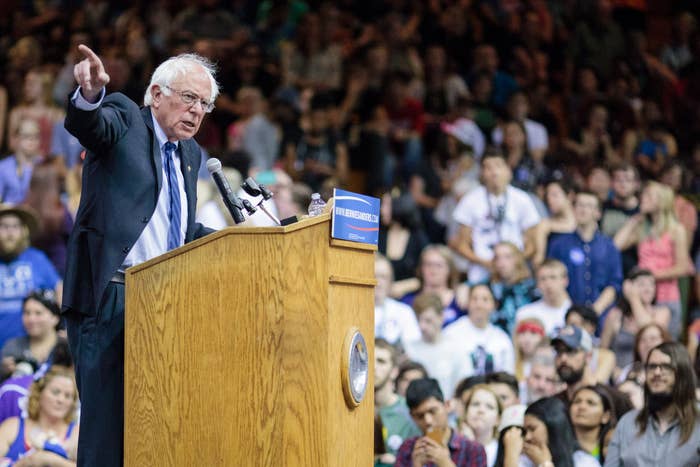
Bernie Sanders officials are considering a drive at the Democratic National Convention this summer to change the way the party picks its nominees.
The senator’s team has spoken openly in recent weeks about their plans to push for a more progressive platform in Philadelphia come July. But campaign advisers are also looking at ways to make permanent changes to the rules his supporters see as designed to preclude outsiders like Sanders, particularly in the caucus system.
The proposals under consideration would take aim at the structure, administration, and transparency of caucuses in key nominating states like Iowa and Nevada, according to senior advisers to the Sanders campaign. Other options include motions to modify the controversial superdelegate system — which allows Democratic insiders to put their thumbs on the scale — as well as closed primaries and party matters such the setup of committees at the national convention.
Sanders himself has kept his focus trained on the primary’s final contests. But advisers also recognize that his path now leads to a symbolic but not insignificant fight in Philadelphia. What remains unclear inside the campaign is how and where Sanders would apply the strength of his “political revolution.” Some argue that the senator has a choice to make, as one senior adviser put it, between “feel-good changes to the platform and fundamental changes to the nominating process.”
Sanders has already waded into both sides of the fight.
Over the weekend, he sent a letter to the chair of the Democratic Party, Rep. Debbie Wasserman Schultz, that accused the DNC of denying his backers equal representation on the crucial platform drafting committee. Meanwhile, signaling an interest in voting reform, the campaign backed an effort by Maine Democrats to move away from the superdelegate system.
Officials stress that Sanders has yet to consider what specifically he would put to Democratic National Convention Standing Committee on Rules , the body at the convention that would consider changes, but the ideas could range from the convention setup to the way the DNC handles access to the party’s shared voter file. (Earlier this year, the Sanders campaign sued the DNC after several of their aides improperly accessed Clinton data made visible to them by a glitch in the system’s vendor.)
Most of the ideas circulating inside the campaign involve voting reform.
One possibility, the senior advisers said, would be the implementation of Republican-style “firehouse” caucuses in place of the less straightforward Democratic system. The difference, in essence: Democratic caucuses require participants to publicly state their preference. Under the “firehouse” caucuses, votes are cast by secret ballot, allowing for a final tally.
The Sanders camp is also weighing a move to specifically target caucus reporting requirements. The Iowa Democratic Party, for instance, reports the number of delegates apportioned at a given caucus site, but not the total number of caucus participants or the number of caucus-goers drawn by each candidate. Earlier this year, after the release of final reporting breakdowns in Iowa, Sanders tried pressuring the state party to release its raw vote totals.
Democratic caucuses have suffered badly this year amid turnout from the Sanders-Clinton race. Frustration and confusion in Iowa and Nevada, the highest-profile caucuses on the Democratic calendar, were commonplace — as were overcrowded and overwhelmed caucus sites in states where Sanders won, such as Maine.
Democratic National Committee chair Debbie Wasserman Schultz said in a recent interview with BuzzFeed News’ politics podcast that she’d like to see caucuses eliminated from the Democratic nominating calendar. (She also said that’s not likely to happen.)
The Clintons have also long expressed private frustration with the caucus system. In a 2012 email, released last year by the State Department, Clinton described caucuses as “creatures of the parties’ extremes.”
Prominent Clinton supporters have also expressed reservations with the caucus system this year. “I think we should look at all this after this is over, after this cycle,” Sen. Al Franken said on Wednesday in an interview.
Franken, one of Clinton’s top surrogates, argued that caucuses may work when candidates can focus on a single state, but that in contests at the end of the calendar like his home state of Minnesota, caucuses should change.
“You can go to Iowa and meet enough people in Iowa for it to be significant that they have a caucus system,” Franken said. “By the time you get to Minnesota, Bernie or Hillary can’t spend that much time to go to one — you know, one bean feed after another.”
CORRECTION
The body at the Democratic National Convention that would consider changes to the way the party operates is called the Democratic National Convention Standing Committee on Rules, not the Rules and Bylaws Committee, as this article originally stated.

